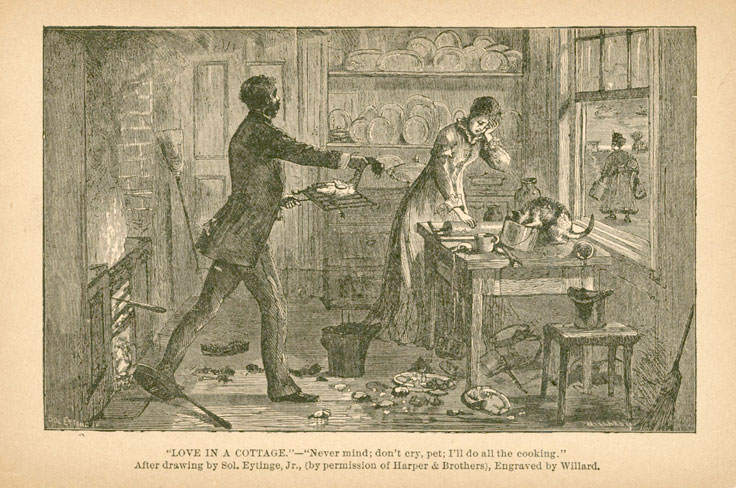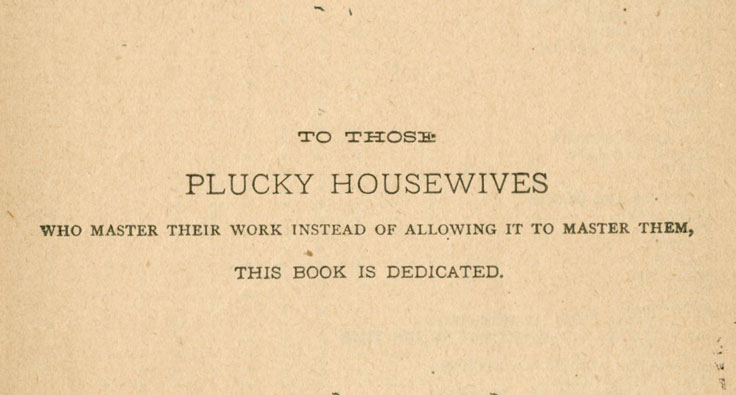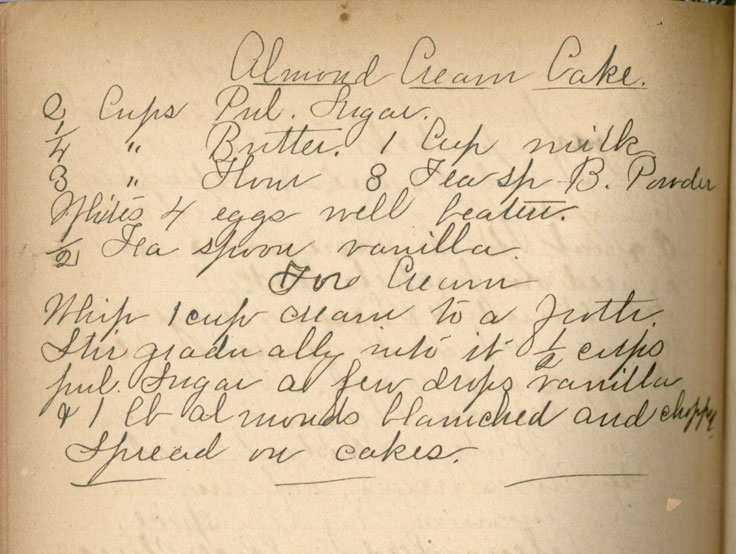
Purchase Tickets
From the Cataloger’s Desk: A New Cookbook in the Collection
August 10, 2018

I begin this month’s blog post with a confession: I am not a very talented cook. In fact, I am not much of a cook at all. Even the most basic tasks, such as boiling eggs or cooking pasta, sometimes leave me a bundle of nerves. However, I thoroughly enjoy cataloging old cookbooks at work. In addition to offering recipes, they provide a fascinating glimpse into gender roles and societal expectations from times long past. Believe it or not, the IHS library has a robust collection of cookbooks that spans several centuries.
Just last month, I cataloged Practical Housekeeping: a Careful Compilation of Tried and Approved Recipes, published in 1888. Needless to say, the tasks of cooking and general housekeeping were very different in the late 19th century. For starters, women bore the brunt of these responsibilities almost exclusively. The dedication page of this book sums it up rather bluntly:
 Homemakers also had to do more with less. I cannot imagine preparing elaborate meals without the help of modern day appliances and basic utensils. There is a chapter in this cookbook devoted to kitchen luxuries. Many of the items described are common staples in today’s homes, such as egg beaters, lemon squeezers, cheese graters, colanders, spice racks and tongs. If only they had a Bed Bath & Beyond store in those days!
Homemakers also had to do more with less. I cannot imagine preparing elaborate meals without the help of modern day appliances and basic utensils. There is a chapter in this cookbook devoted to kitchen luxuries. Many of the items described are common staples in today’s homes, such as egg beaters, lemon squeezers, cheese graters, colanders, spice racks and tongs. If only they had a Bed Bath & Beyond store in those days!
 Interestingly, many cookbooks published at this time included more than just food recipes. Here is a sampling of additional topics discussed in Practical Housekeeping: the value of fuel, doing laundry, taking care of babies, hints for the sick-room, the arts of the toilet, accidents, sudden sickness, floral design and dress-making. As you can see, it offered a wealth of information and helpful tips to homemakers. And if the condition of this book is anything to go by, it was used on a fairly regular basis over the last 130 years.
Interestingly, many cookbooks published at this time included more than just food recipes. Here is a sampling of additional topics discussed in Practical Housekeeping: the value of fuel, doing laundry, taking care of babies, hints for the sick-room, the arts of the toilet, accidents, sudden sickness, floral design and dress-making. As you can see, it offered a wealth of information and helpful tips to homemakers. And if the condition of this book is anything to go by, it was used on a fairly regular basis over the last 130 years.
Finally, if you have read my other blog posts, you know that I like to think of books as historical objects. I appreciate the things that make them unique and tell a story, such as provenance, inscriptions, marginalia and accompanying material. This cookbook has a little bit of everything, but I especially appreciate the handwritten recipes contributed by a previous owner on several of the blank pages. Here is just one example:
 If you are interested in history, cooking, and/or unique cookbooks, I encourage you to explore our library’s impressive collection. The catalog record for Practical Housekeeping: a Careful Compilation of Tried and Approved Recipes can be found here.
If you are interested in history, cooking, and/or unique cookbooks, I encourage you to explore our library’s impressive collection. The catalog record for Practical Housekeeping: a Careful Compilation of Tried and Approved Recipes can be found here.









